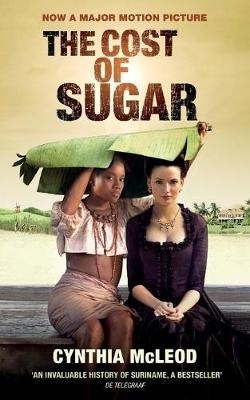This is the second novel that I have read by Cynthia McLeod. She is a hard author for me to review. On one hand I love the stories that she tells. She gives you a look into life in colonial Suriname, on the northeast coast of South America. She tells stories that I haven't heard from any other author. The previous book I read of hers, The Free Negress Elisabeth, is a story that has stayed in my mind because it is the type of women's history that is so often overlooked. I want to put her books in everyone's hands and tell them they have to hear about this.
On the other hand though, the writing in the books just isn't very good. Clunky is the word that keeps coming to mind. I'm reading an English translation from the Dutch but I don't think that is the whole issue. She is so careful to have so much documented historical fact in the books that she info-dumps continuously. That doesn't usually bother me in a story but these passages aren't blended into the fictional story that she is telling well. She even has footnotes. I'm not sure what the footnotes were about because many of them weren't translated. The untranslated ones appeared to be quotes.
I've had this book for a long time before reading it. I tried to start it a few times but the writing style made me stop after a few pages. I decided to knuckle down and read it for Women in Translation Month. Once I decided to power through, I read it in less than a day. The story carries you through.
One early wave of settlers to Suriname were Portuguese Jews who migrated from Brazil. They set up large plantations and did well for themselves. Subsequent waves of settlers from Holland though were anti-Semitic and over time the Jewish families found themselves not at the top of society anymore. This is the story of two half-sisters, one had two Jewish parents and one had only a Jewish father so was not considered Jewish herself. The story shows how their lives diverge as Suriname begins to deal with the effects of people living too far in debt for them to maintain.
White people in Suriname did nothing for themselves. There were so many more enslaved people than white people that whites gave all responsibilities for running their lives to the slaves. With nothing to do, they entertained themselves with lavish parties that lasted for weeks. Gossip was rampant. There wasn't a single rich white person that I didn't want to slap at some point in this book.
The Cost of Sugar refers to all the lives wasted in the plantation system - the enslaved people, the white landowners, the Dutch soldiers brought into protect the plantations, the escaped and free blacks living in the jungle. It was a system that hurt everyone.
"It now occurred to Elza that her family was in fact a model for all Suriname society. Wasn’t everyone and everything totally dependent on the slaves? Just as she felt so completely lost without Maisa, so the colony would be totally lost without its slaves. They did everything and knew everything, and the whites knew nothing and were incapable of anything. The whites needed the negroes, but the negroes didn’t need a single white person"
This review was originally posted on Based On A True Story
